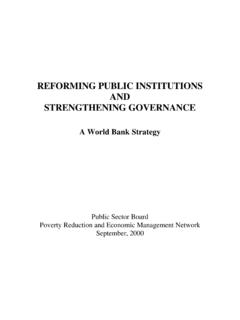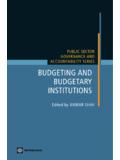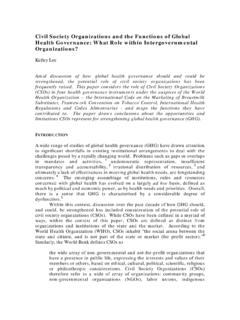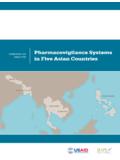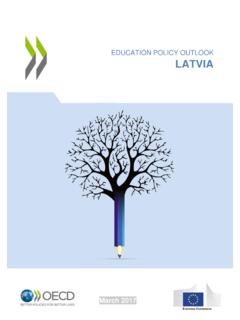Transcription of Public Private Partnership Training Programme - OECD.org
1 1 Public Private Partnership Training Programme New Fairmount Hotel Livingstone, Zambia 19-23 March 2012 This workshop has been co-organised with: This workshop has been organised with the generous support of: 3 BACKGROUND Objective The NEPAD-OECD Africa Investment Initiative is dedicated to working with its African and international partners to promote policies that improve the investment climate in Africa. It does so through: its role as a convener of African experts and policymakers at its annual ministerial meetings and expert roundtables; analytical work, studies, and publications; capacity-building activities; and investment policy reviews of select African countries.
2 To move this work forward, the Initiative makes use of OECD investment instruments such as the Policy Framework for Investment and the OECD Principles for Private Sector Participation in Infrastructure. It also stresses peer learning and concrete reforms at national and regional levels. For the past several years, the Initiative has focused on the role of the Private sector in strengthening Africa s infrastructure. At successive roundtables and high-level meetings, participants analysed the constraints and opportunities for boosting Private investment in water and sanitation (Zambia 2007), transport (Uganda 2008) and energy (South Africa 2009).
3 Having built up a strong critical mass of knowledge and a wide network of stakeholders on this issue, the Initiative is now aiming to develop a Training Programme for Public Private Partnerships (PPPs) aimed at African government officials interested in developing their capacity to design and implement PPP programmes. The Need for Capacity Building in Africa s Infrastructure The state of Africa s infrastructure is dismal by any measure. Across the continent, there are few paved roads, inadequate sewerage systems, frequent power cuts, and poor maintenance of ports and corridors, as well as many other challenges.
4 According to the 2009 Africa Infrastructure Country Diagnostic study, Africa s spending needs for infrastructure amount to US$93 billion a year, split between capital expenditure and maintenance of existing facilities. The challenge of boosting Africa s infrastructure is not only financial, but entails policy reforms to improve the investment climate for infrastructure in Africa. The Initiative has prepared a number of background papers for its ministerial meetings analyzing the impediments to Private investment in Africa s infrastructure and recommending solutions for overcoming One worthwhile strategy is the use of PPPs to increase efficiency, improve management, and raise funds for infrastructure projects.
5 By allowing the Private sector to contribute its knowledge, techniques and funding, PPPs enable the Public sector to reach goals it would not be able to meet on its own. As they require more stringent policy conditions than other projects to interest Private financiers, they also constitute an incentive for improving the quality of the legal and regulatory framework. It is therefore imperative that officials understand PPPs and how they can be used to develop Africa s infrastructure. : The Training Course The goal of the Training Course is to give government officials the skills they need to undertake infrastructure projects, from inception to termination.
6 It will empower them with the knowledge to develop and implement policies that strengthen the environment for infrastructure PPPs in their countries. 1 Please see the following website, under Meetings for access to the analytical papers: 4 The Course can be undertaken at various levels: i) Continental: bringing together participants from all over Africa. This Training course will be organised with the African Development Institute (ADI) of the African Development Bank. ii) Regional: the Course can be undertaken in a specific Regional Economic Community (REC) and bring together participants from the countries in the region to address the cross-border PPP issues of the region.
7 This course will be organised with the NEPAD Infrastructure Project Preparation Facility (IPPF). iii) National: the Course can be adapted to a specific country, and address its needs and constraints in terms of developing PPPs. The Course will be undertaken by the NEPAD-OECD Africa Investment Initiative in conjunction with its network of infrastructure partners. Benefits of the Course This course is aimed at professionals who have some experience with infrastructure projects and wish to improve their knowledge and decision-making capacity to enact policies related to PPPs.
8 Led by instructors who are leaders in their field, the course aims that participants: Gain in-depth knowledge of PPPs in order to better develop policy frameworks and manage projects Be armed with multiple, concrete examples of projects and how to maximize their success while addressing problems that might cause them to fail; Expand their professional networks; Improve management and policy-making skills through role-plays and other team exercises that simulate different stages of a PPP management cycle. Gain specific tools and strategies for reforming institutions and creating new ones to facilitate PPPs in their home countries or RECs.
9 5 PROFILES OF LECTURERS James Aiello James Aiello is a Senior Project Advisor with the PPP Unit at National Treasury in South Africa. He is currently focusing on the Contract Management of two early PPPs to ensure they continue to demonstrate affordability and value for money: the Universitas and Pelonomi Hospitals Joint Use PPP (Free State Province) and the State Vaccine Institute PPP (National Department of Health). He recently assisted in the renegotiation of The Chapman s Peak Toll Road PPP sponsored by the Province of the Western Cape.
10 James came to the South African National Treasury in 2007 from PricewaterhouseCoopers. While at PWC in Johannesburg, James was a member of the team that advised the Government of Botswana on its PPP policy and regulatory framework which was launched in August 2009. He previously completed an assignment drafting National Treasury guidelines for municipal PPPs in South Africa. In 2008, he addressed a conference of nodal PPP officials from India s 28 States in Cochin, India. He also provided the Government of Swaziland a PPP regulatory framework.










